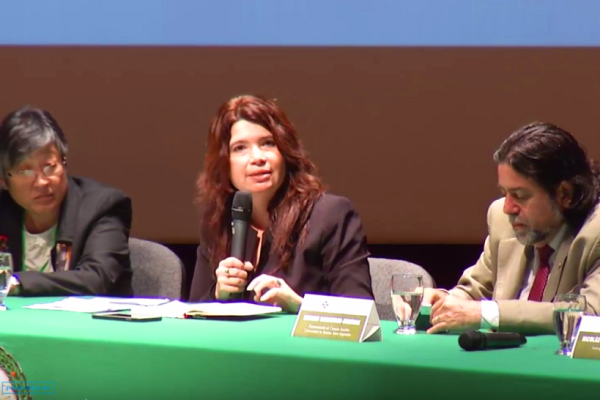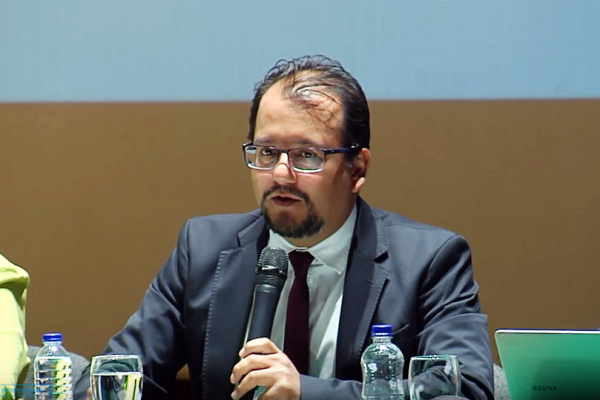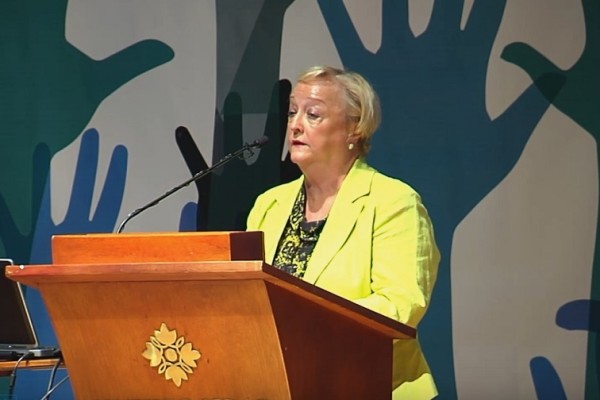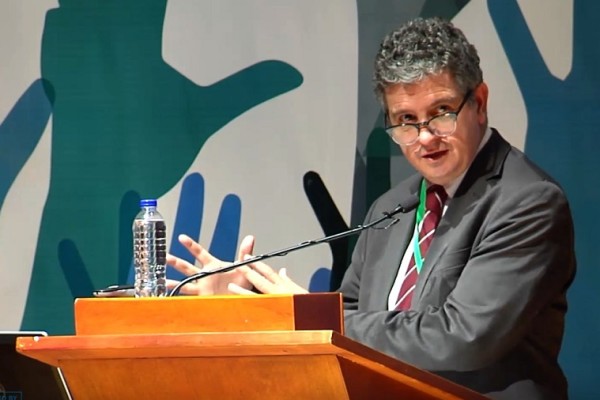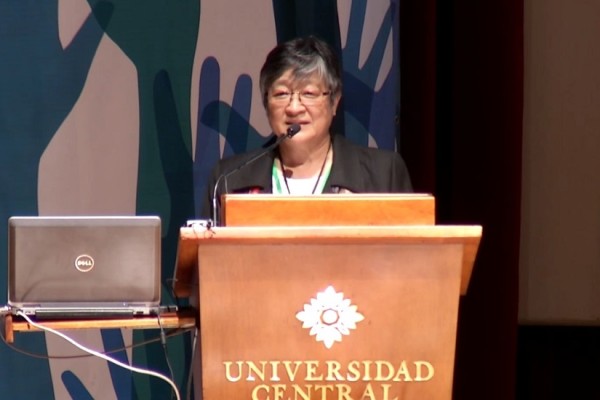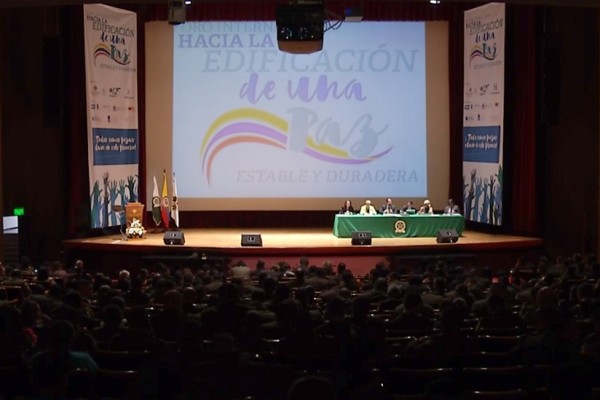The “how” is as important as the “what”: Interpeace’s contribution to the International Peacebuilding Forum in Colombia
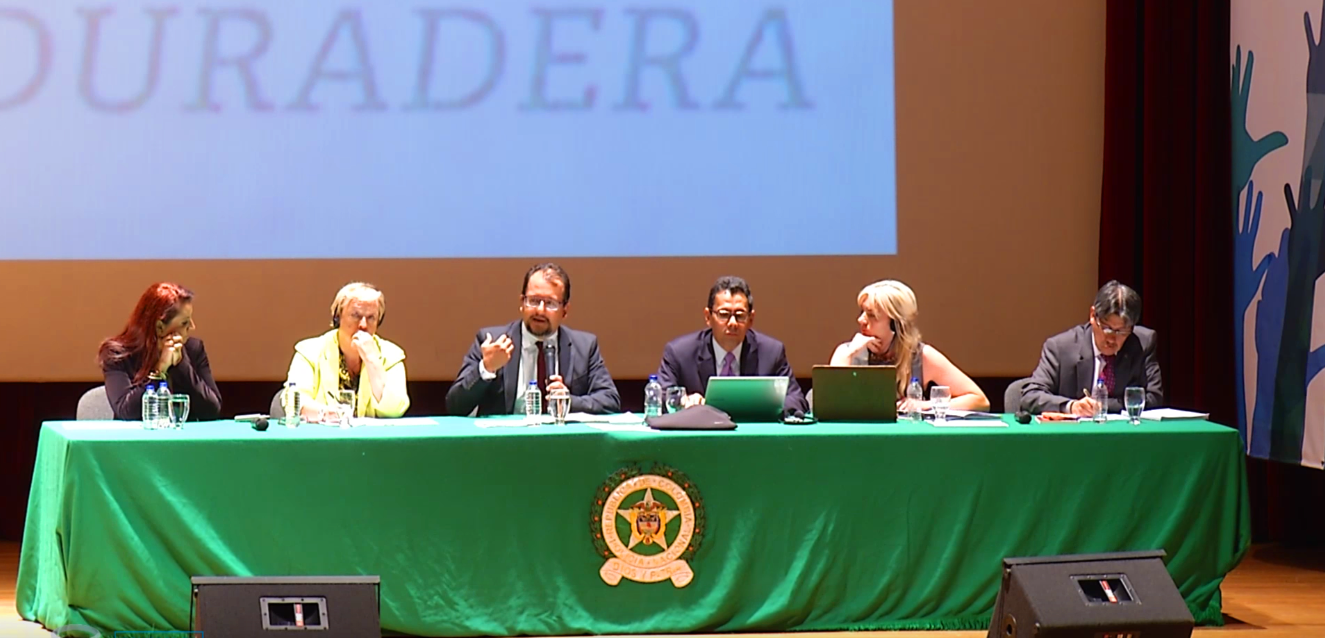
Interpeace was part of the International Forum "Towards building a stable and lasting peace," which took place at the Central University of Colombia, with the support of the Colombian National Police, from November 16 through 18.
Within the framework of this event, the challenges that Colombia will face after the end of the armed conflict were analyzed by the participants. Moreover, they examined the constitutional, legal, institutional and political conditions that can facilitate building peace in the country and also sought to propose an innovative approach to rethink the concept of security and coexistence under the principles of peacebuilding.
Representatives of Interpeace and our strategic partner, Alianza Para la Paz, shared experiences and reflections on the lessons learned in other contexts, such as South Africa, Northern Ireland and Guatemala, and the importance of understanding peace agreements, as the beginning of a stable and lasting peacebuilding process.
Ana Glenda Tager, Regional Director for Interpeace’s Office for Latin America, moderated the debate “Towards a shared vision of peace: challenges and obstacles.” She highlighted the importance of the forum as an occasion to define the bases of action for the Colombian National Police in the field of peacebuilding, particularly through its specialized unit, UNIPEP. Additionally, she spoke about the geopolitical context and the causes that generated the Colombian civil war. Ana Glenda Tager also stressed the importance of establishing a viable methodology for building peace in Colombia and pointed out: “Among the challenges, one of the fundamental obstacles is the fear of change, the fear of transformation. For this reason, in the peacebuilding process, the ‘how’ is as important as the ‘what’.”
Watch Ana Glenda Tager at the Forum here (Min 1.07.00 - in Spanish).
Project Director of our strategic partner Alianza Para la Paz, Otto Argueta, also moderated a debate during the Forum: "Constitutional, legal, political and institutional determinants that will facilitate building peace." During this dialogue, he stressed the importance of putting the human factor at the center of the peacebuilding debates, that is, the necessity to understand the perspectives of both parties involved in the conflict. In addition, he spoke about how peace is not an event crystallized in time, but rather a dynamic process of reconciliation between opposing parties, whose most important result is the reestablishment of the bonds of trust. "As Mandela once stated - peace is not made with friends, it is made with enemies - and this means to make an effort to approach the others," he expressed.
In the same debate, Monica McWilliams, a key figure in the Northern Ireland peace negotiations and Vice-Chair of Interpeace’s Governing Council, shared her experiences during the peace process in her country: “In Northern Ireland, we spent many months talking to guerrilla leaders, intelligence services and with the police. However, it wasn’t until the day when peace was signed, when it was possible to have all these actors agree, that we realized that from that moment on, the hardest work was beginning.” McWilliams added that the military solution did not work in Northern Ireland, and that the best results were achieved through dialogue, diplomacy and politics.
Watch Otto Argueta and Monica McWilliams at the Forum here (Monica McWilliams in Min 1.13.00 and Otto Argueta in Min 2.10.00 - in Spanish).
Graeme Simpson, Director of Interpeace USA, shared his experience in peacebuilding and transitional justice in South Africa. During the session “Reconfiguration of the concept of security and citizen coexistence in a post-war context,” Graeme Simpson stated that in the peacebuilding field there are no prefabricated models and each society must find the best solutions for their specific context. He added that when addressing the issue of transitional justice, and specifically of amnesty, key elements in the Colombian peace process that must be taken into account, are not only the rights of demilitarized guerrillas, but also the rights of victims of the guerrilla movement, in order to legitimize the agreements. "When building peace, it is essential to rebuild trust between the people and between the people and the state. In South Africa, we did not address the social and cultural issues behind the agreements. These issues are fundamental to building peaceful and equitable societies,” Simpson said.
Watch Graeme Simpson at the Forum here (Min 00.18.00 - in Spanish).
Interpeace’s Regional Office for Latin America has worked in Guatemala for over a decade and as part of the exchange of experiences and lessons learned from countries that have dealt with the implementation of peace processes, invited human rights activist Helen Mack to participate in the forum. Helen Mack is the founder of the Myrna Mack Foundation and is recognized worldwide for her fight against impunity in Guatemala. During her intervention, she spoke about Guatemala’s peacebuilding challenges and her personal involvement. “I have been stigmatized and criminalized for demanding rights, for example the right to justice,” Mack expressed. She highlighted not only the positive accounts of Guatemala’s peacebuilding experience, but more importantly spoke about the mistakes that were made and what wasn’t done.
Watch Helen Mack in the Forum here (Video in Spanish).
The international forum "Towards building a stable and lasting peace" constituted a privileged space for reflection and analysis of this fundamental stage in the history of Colombia. The forum provided the opportunity to get views and opinions from experts on peacebuilding, transitional justice and international cooperation. In addition, several issues were addressed about the peace process with the FARC-EP for the termination of the conflict. Moreover, opinions and proposals were heard to identify common denominators, innovative programs and good practices, to address the challenges for the consolidation of a peaceful, equitable and inclusive Colombia.
